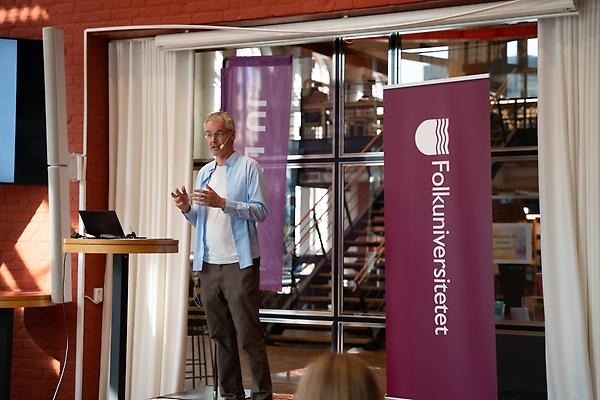JU LIVE kicked off with a lecture on violent radicalization
Marco Nilsson, Assistant Professor of Political Sciencein at the School of Education and Communication at Jönköping University, started the autumn semester's popular lecture series JU LIVE. Around 30 people listened attentively as Marco spoke about his research on violent radicalization.
%20marco1.jpg)
Marco Nilsson at JU LIVE.
Having researched jihad and radicalization for over 10 years, Marco Nilsson has a solid knowledge of the subject, which became clear during the lecture entitled “What we know and don't know about violent radicalization - New ways to prevent it”.
“I became interested in the topic because so many people went down to Syria at the beginning of the civil war. In addition, radicalization became an important issue for society to understand and deal with,” says Marco Nilsson.
Marco started his lecture with some background, partly about his research, partly about how we in the Nordic countries were taken by surprise by so many going down to fight in Syria. He explained that this is naturally a rather difficult area of research, and that it took over a year before he could conduct his first interview with a jihadist.
Religion does not increase the risk of radicalization
Many may believe that radicalization originates from religion, but Marco says that religion does not have much influence on those who are recruited to jihadists. Recruiters don't choose people at random, they look for people who have gone through or are going through a crisis in their lives. This could be a death in the family, absent fathers, failures at school or work, experiences of racism or rejection of their asylum application. This makes them receptive to new ideas and behaviours that can give them new meaning in life.
%20marco3.jpg)
The audience listened attentively to the lecture held in JU's beautiful library.
Many people from Sweden and the Nordic countries went down to Syria to fight in the war, but Marco was clear that, after all, only a minority of those who are exposed to recruitment attempts are then recruited. Marco pointed out some ways to possibly prevent radicalization, including giving young people positive contexts and ways to be active, trying to create positive identities and roles that counteract polarization.
Marco's research on radicalization is solid, but he believes that there are knowledge gaps in the research field about preventing radicalization and what creates resilience (the ability to withstand and cope with a change, as well as recover and further develop) against recruitment attempts. This is something that Marco hopes to research in the future.
JU LIVE - a popular concept
This is the third semester of the JU LIVE lecture series. The idea is that Jönköping University's researchers in a more relaxed way can tell the public about their important research.
“JU LIVE is very good because as a researcher, I can reach out to a varied audience that does not only consist of students and other researchers. It is very important that our research at JU is relevant to the public,” says Marco Nilsson.
Like the audience, Marco thought the lecture went well.
“There was a very nice atmosphere during the lecture. It is always nice to lecture when the audience is interested and asks questions,” he says.
%20borje.jpg)
Börje Nierot was satisfied with the lecture and will attend more JU LIVE.
Börje Nierot from Jönköping sat in the audience and listened to the lecture with interest. He has a broad general interest.
“It was a very good and interesting lecture. I was not so well read on the subject before, so I got a lot of new knowledge. I've attended JU LIVE before and I'm sure I will come back,” he says.
Upcoming lectures (all lectures are in Swedish)
29 August - What we know and don't know about violent radicalization - New ways to prevent it.
Marco Nilsson, School of Education and Communication
19 September - Sleep deprivation in young people: A growing problem.
Malin Jakobsson, School of Health and Welfare
31 October - All light on health! The importance of light for human well-being.
Johan Röklander and Mathias Adamsson, School of Engineering
28 November - What is a foundation and how do they affect our society?
Kajsa Haag, Ulf Olaison, Jönköping International Business School and Hanna Almlöf, Linköping University
